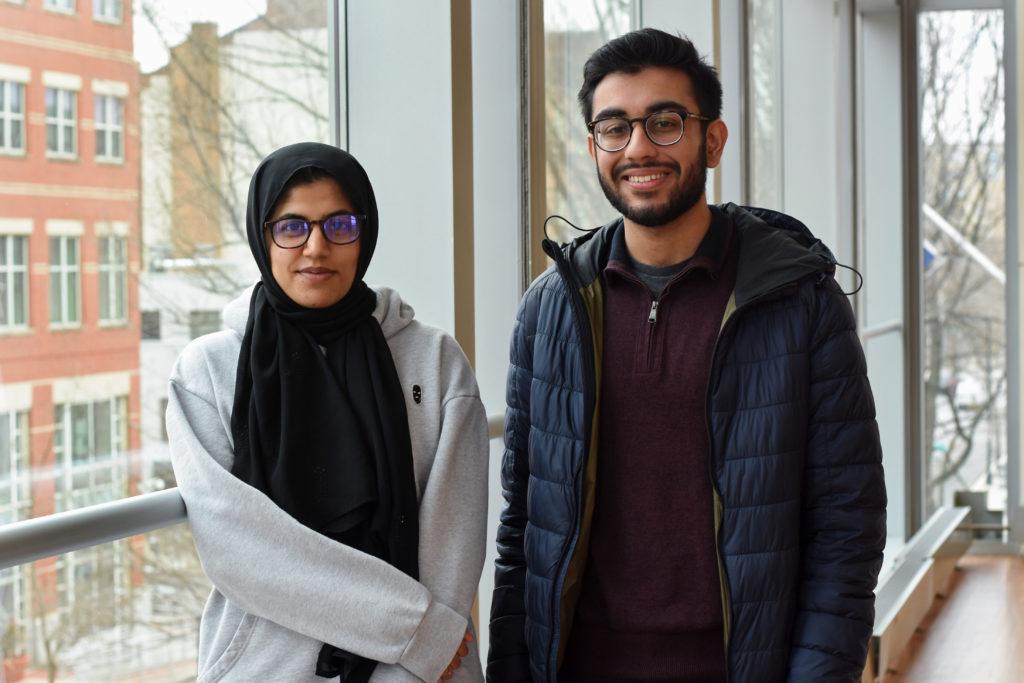The Muslim Students’ Association is raising money to aid Syrian refugees.
The MSA is partnering with United Mission for Relief and Development, a humanitarian relief organization, to host a “Serving Up Kindness” banquet on March 1 in the Marvin Center. Student leaders said the event is a way for members of MSA and Muslim students to extend their reach outside campus and actively practice charity, one of the main pillars of their faith.
“I hope people can recognize that even if you’re an American Muslim or just an American student in Washington, D.C., you can still make an impact on things that are happening on the other side of the world,” Abdullah Tauqeer, the co-president of MSA, said.
The event will raise money for United Mission for Relief and Development’s psycho-social support program, which provides Syrian refugees in Jordan with consultations on topics like harassment and hygiene. The program also offers counseling, mental health and rehabilitation services for Syrians affected by the refugee crisis, according to its website.
Tickets for the event cost $20, according to the event’s Facebook page.
The banquet, a first-time event for the MSA that will include a catered dinner, will feature guest speaker Yaser Birjas, the head of the Islamic Law and Theory Department at the AlMaghrib Institute, who will discuss the importance of mental health in the Muslim community, Tauqeer said. He said the event will also feature student performers who will sing or play instruments.
Tauqeer said members of MSA will create “peace wall” in the Marvin Center room, where attendees can write messages to refugees and hang them up. The letters will later be sent to Syrian refugees in Jordan through United Mission for Relief and Development, he said.
“Most of the time, when people raise money to send overseas it is for direct relief, which is obviously a great thing for food, water, clothes – things like that,” Tauqeer said. “But this caught my eye when I was given the option because it was innovative, it was a new way to raise something that’s definitely a need.”
Members have advertised the event on social media and posters hung around campus, Tauqeer said. He said the MSA also reached out to local mosques and MSAs at other universities in the District in the hopes that they will attend.
Tauqeer said the fundraiser is a “concrete way” to help the Syrian refugee crisis because attendees know the funds will be used to improve refugees’ mental health. Members of MSA do not have a target number of attendees or amount of money to raise because the event is being held for the first time, he said.
The MSA also joined a global organization for a weeklong charity event last October that raised money for orphanages and schools in countries like Somalia and Pakistan.
Bushra Idlibi, the chapters and development coordinator for United Mission for Relief and Development, said members of MSA contacted the organization to plan the fundraiser, and about two representatives will attend to the event to speak about the organization. She said members of United Mission for Relief and Development helped MSA secure a speaker and brainstorm details about the event, like the peace wall.
“We are so excited to get the GW students more involved in our programs and volunteering opportunities, so we hope to stay connected in that way,” she said.
Isha Rauf, the co-president of the MSA, said the organization and the wider Muslim community at GW are always looking for ways to give back to their religious community. She said the event is an opportunity to donate to an international cause rather than local organizations, which the association has typically focused on in the past.
“It’s not just restricted to people who a part of the MSA or to only our Muslim students on campus – this is an event open to everyone and we want everyone to feel welcome here,” Rauf said. “It’s just an event for us to get people more aware of what’s happening.”
She added that the Syrian refugee crisis, the Yemeni crisis and the Palestinian crisis are some of the biggest issues facing the Muslim world. The Syrian refugee crisis began in 2011 after a conflict between the Syrian president and protesters sparked a civil war, pushing thousands of Syrians to flee to nearby countries.
“We really felt that the message was important and something that we could actually back instead of feeling like we were only half-heartedly doing this event,” Rauf said.
Sophia Mohamed, the secretary of MSA, said donations and money raised during the event will go toward lessons on coping mechanisms, mitigating trauma and critical thinking for Syrian refugees. All of the resources are geared toward refugee families, specifically women and children, she said.
“As students, we have the power to bring attention to significant issues that we are passionate about and it is something that we should always strive to do because we can make a great difference,” Mohamed said.





